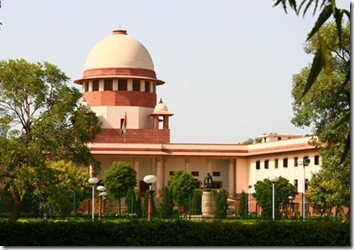
Day two of chief justice SH Kapadia’s constitutional bench hearing of the matter of press freedoms and individual rights saw the debate centered on the introduction of a “test of postponement” which will empower a judge in a criminal trial to prevent its publication if there is an apprehension of prejudice to the accused or any witness.
The court mulled framing parameters for media reportage of criminal cases, pending legislation on the subject which the court will recommend to the government. The court was keen to introduce the test of postponement in the proposed guidelines, the enforceability of which was also debated.
Senior counsel Fali Nariman, appearing for applicant Sahara India, opposed the idea of the court laying down general guidelines, but said it could issue orders in specific cases restraining the press from publication that is prejudicial to business sentiment or judicial process, according to The Hindu. He said that instead of the court building a cocoon around itself in the information age, it should report journalistic misconduct to the publication’s editor or the Press Council of India.
“We are not interested in controlling content. But we are concerned with postponement,”, Mint reported the court as saying, as the bench adopted senior advocate Soli Sorabjee’s submissions that the media should not be allowed to report a case until a judge takes note of it because it would otherwise needlessly “prejudice the accused”.
The court asked, "Can in an appropriate case, the court concerned impose deferment of reporting on coming to the conclusion that reporting of the proceedings ran a real risk of causing prejudice to the accused and interfere with the administration of justice? At what stage and time should such order of deferment of reporting be passed?" Times of India reported.
Nariman raised the contention that postponement is not a viable solution as it amounted to ban on reporting. "In the absence of law empowering the court to do so, the remedy could be worse than the problem," he said. Advocate Anup Bhambhani appearing for the News Broadcasters Association seconded Nariman, stating that “news is a perishable commodity”. Bhambhani suggested that if there was to be a postponement, it should only apply to in-camera proceedings.
Attorney general G E Vahanvati also supported Nariman, quoting Bentham who said that there was no justice where there was no publicity.
Justice Khehar pointed out that the media, in creating prejudices, tarnishes the judge’s reputation, thus adversely affecting his judgment which becomes suspect, while Kapadia elicited that the press issues denials and clarifications when the damage has already been done.
Day two also saw an appreciation of media’s role and constraints by the bench which shot down senior counsel Sidhharth Luthra’s contention that independence of news was being lost in news outlets serving more views than news. Kapadia responded: “The ground reality is if they publish only news nobody will read their newspaper.” Kapadia also acknowledged the fact that a proactive media has many a times expedited a slow criminal investigation.
Rajeev Dhavan, representing the Editors Guild of India, begins his arguments for journalists and media professionals today, premising on the contention that India’s “open justice” system which ensures judicial transparency should not be sacrificed for reputations of the accused which can be resolved through contempt and defamation proceedings. He said, "In the last 200 years of common law development, no effort ever had been made to frame punitive guidelines. It has never happened."
On day 1, the mood in court was combative as senior counsel, 11 of whom had complained to Kapadia about media coverage, criticised his proposal to frame a new law to regulate court coverage of media beyond the existing contempt of court laws.